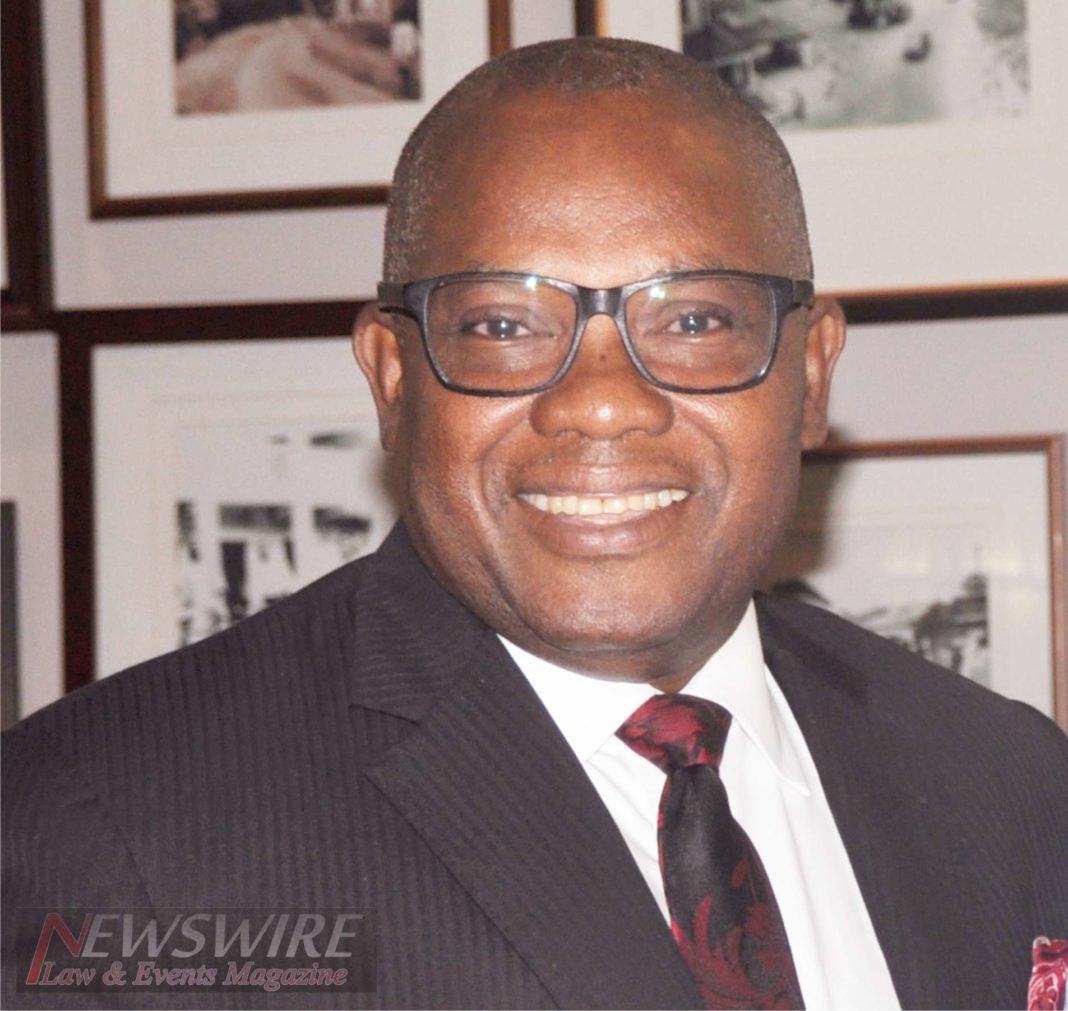Africa’s Energy Transition: Electrification and Diversification By George Etomi
Developing countries face the twin challenges of developing stronger economies through actions such as expanded energy supply, increased agricultural production and better transportation systems, while also playing an active role in global efforts to reduce greenhouse gas emissions, etc.
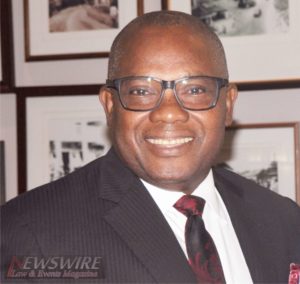
The concept of energy access and transition are intrinsically tied to the concept of Sustainable Development Goal 7 (SDG 7) which provides thus to: “Ensure access to affordable, reliable, sustainable and modern energy for all”.
African governments have pushing for universal energy access by 2030 and as such the 600 million people without access to electricity are now being looked at as a market of people that need real solutions that meet their aspirations and needs.
This presentation by Mr. George Etomi, a director on the Board of Eko Electricity Distribution Plc. (EKEDP) aims to provide an overview of the policy nuances of the energy industry of Nigeria. It will also focus on unpacking the targets of energy efficiency, the challenges and initiatives employed in the electrification and diversification of supply sources in African countries.
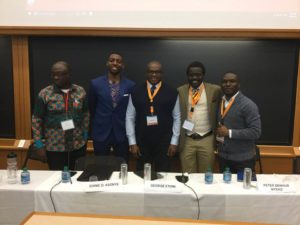
According to the International Energy Agency (IEA), energy efficiency is considered as “a critical tool to relieve pressure on energy supply”.
“Energy efficiency offers an immense low-cost energy resource – but only if innovative business models can be developed to unlock its entire potential.”
“Effective energy, transition, diversification and efficiency programs will therefore take into account the entire energy mix and the possibility of expanding them to achieve energy security, accessibility and affordability, yet remaining environmentally friendly.”
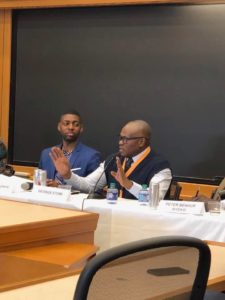
With focus on the power sector of Nigeria, some of the policy initiatives undertaken by the Federal Government of Nigeria (FGN) to achieve energy transition, diversification and efficiency targets can be summarized as follows.
- The policy legislator; National Electric Power Policy (NEPP) and the issuing authority; Electric Power Implementation Committee (EPIC) has directed and outlined Policy framework for power reform agenda in Nigeria, and have set a target of 10% renewable energy mix for all new connections by 2020.
- Renewable Energy Master Plan (REMP) who’s issuing authority is Energy Commission of Nigeria (ECN), supports the increased supply of renewable electricity from 13% of electricity generation in 2015 to 23% in 2025 and 36% in 2030
- Although it is not yet formulated into a law governing the renewable energy development in Nigeria it encourages the integration of renewables (with particular emphasis on solar energy)
- National Energy Efficiency Action Plans (NEEAP) who’s issuing authority is the Ministry of Power directs the Minister of Power to develop the National Energy Efficiency Action Plans (NEEAP) within 6-12 months of the approval of the NREEEP. The goal is to accelerate the implementation of NREEEP.
The National Energy Efficiency Action Plans (NEEAP) projected that by 2020, efficient lighting will be used by 40% of the households for high-energy consuming sectors (transport, power and industrial sectors), and it will increase by at least 20% compared to baseline. It will achieve distribution loss reduction target to 15-20%, achieve 10% bio-fuel blends and improve the efficiency of the bio-energy sector.
It is also projected that by 2030, efficient lighting will be used by almost 100% of the households; high-energy consuming sectors (transport, power and industrial sectors), efficient energy will increase by at least 50% compared to baseline; curb the firewood demand below supply capacity; and achieve distribution loss reduction target to less than 10%.
There is no doubt Nigeria has huge energy deficiency that negatively impacts on the economy, which affects the power sector through the end users’ reluctance to pay for energy consumed based on low generation levels which in turn result in high ATC&C losses, thus leading to a vicious cycle. Hence, energy efficiency is unarguably the most cost-effective solution to close the huge gap between energy demand and supply in Nigeria, as well as, a strategy to make power more affordable for the customers, and improve revenue collection by the distribution companies.
A number of challenges exist in the Africa’s Energy Transition Process some of which have being identified as; policy inconsistency and lack of political will; Inadequate green energy development blueprint; High level of poverty with vast number of African people living below the poverty line; Energy transition is externally driven by the international donors; and Lack of locally trained workforce to drive the transition process;
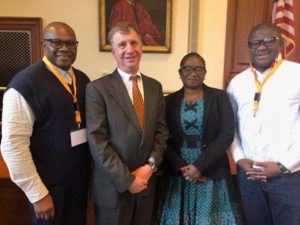

Mr. Etomi and other experts have also identified clear pathways to the energy transition in Africa. They are; Need to provide a robust investment environment for incentivizing clean energy investments in African countries; Need to embrace climate smart technologies; Need to promote sustainability, efficiency and productivity; and need for African-owned political framework to expand the energy mix.
BUSINESS OPPORTUNITIES IN THE POWER SECTOR: FOCUS ON METERING
The Nigerian Electricity Regulatory Commission (NERC) recently released a regulation on third party metering (NERC Regulation on Meter Assets Providers 2018). It is estimated to attract over 200 Billion naira into the NESI and intended to relief the DisCos of the financial burden of meeting their metering targets required to foster efficiency in the operations of their network. The regulation seeks to unlock the local industry for mass production and roll out of metering products and services to serve the Nigerian Electricity Supply Industry (NESI). It therefore behoves on investors to seize this business opportunity to accelerate growth in the NESI.
TECHNOLOGICAL APPROACH TO IMPLEMENTING ENERGY EFFICIENCY PROGRAM OF EKO ELECTRICITY DISTRIBUTION COMPANY (EKEDC PLC)
There are a number of technological platforms deployed by Eko Electricity Distribution Company to drive energy efficiency strategies, some of which are:
Program to automate the utility network through roll out of Supervisory Control and Data Acquisition (SCADA) program; and deployment of Automated Load Scheduling Device (ALSD): With the recent advances in smart grid technologies as well as the increasing dissemination of smart meters, the electricity usage of every moment can be detected in modern smart building environments. Thus, the utility company adopts different price of electricity at each time slot considering the peak time;
- Mobile application for promoting Energy Efficiency: To calculate energy performance levels (i.e., asset rating methodology), a qualified expert needs to have access to at least the full project documentation and/or conduct an on-site inspection of the buildings. Energy performance certification costs a lot of time and money. Moreover, the database of certified buildings is still actually quite small. A need, therefore, is increasing for a simplified and user-friendly energy performance prediction tool for non-specialists. Also, a database which allows building owners and users to compare best practices is required;
- Deployment of engineering capabilities around Capacitor Banks to optimize available energy: Capacitor Banks are common devices in power distribution systems. They provide reactive power, thereby improving power factor, reduced line loses, improved feeder voltage profile, and lower power line loadings. In order to obtain optimal power factor correction and voltage profile, banks of various sizes are selectively placed along each feeder. Once in operation, unmonitored capacitor banks are difficult to evaluate and their real performance is often unknown. While Sophisticated systems provide communication to each and every bank for remote monitoring and control, this practice is expensive and not widespread in the electric utility industry;
- Advanced Metering Infrastructure (AMI): These systems enable measurement of detailed, time-based information and frequent collection and transmittal of such information to various parties. AMI typically refers to the full measurement and collection system that includes meters at the customer site, communication networks between the customer and a service provider, such as an electric, gas, or water utility, and data reception and management systems that make the information available to the service provider; and
- Promoting the use of energy efficient appliances and bulbs as well as creating awareness to customers on turning off their appliances when not in use, etc.
In conclusion, the energy efficiency program for Eko Electricity Distribution Company is mainly designed to manage supply and support customer habits for saving energy so that more energy will be available for distribution.
The Nigerian Electricity Supply Industry (NESI) has a long journey ahead of it in order to attain international competitive standards.
Given that energy supply is limited, part of the endogenous solutions applied by the Eko Electricity Distribution Company is to optimise the available energy through deployment of technological solutions such as SCADA, ALSD, AMI and mobile applications to drive energy efficiency.
A focus on energy efficiency in Africa in parallel with new energy supply (central station power generation, mini-grids, and distributed renewable generation) can help reduce energy intensity, realize energy savings, lower the carbon footprint, create jobs and markets for energy efficiency related products and services, and allow electricity generation expansion to meet increasing demand in a timely, low-cost, and sustainable way.
Mr. George Etomi is the founding partner of George Etomi & Partners. He delivered this presentation during the 9th African Development Conference at the Harvard University Center for African Studies in Boston, USA, on the 23rd – 25th of March, 2018.
Do you need to be heard? Or your articles published? Send your views, messages, articles or press release to: newswiremagazine@yahoo.co.uk >>> We can cover your (LAW) events at the first Call: 08039218044, 08024004726
-Advertisement-
Grab our latest Magazine, "Chief Wole Olanipekun, CFR, SAN, A man of wide horizons and deep intentions". Get your order fast and stress free.
For more details about Newswire Law&Events Magazine, kindly reach out to us on 08039218044, 09070309355. Email: newswiremagazine@yahoo.co.uk. You will be glad you did


